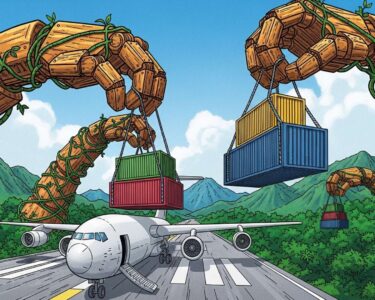Alajuela, Costa Rica — CUTRIS, ALAJUELA – In a targeted strike against illicit resource extraction, Costa Rica’s Public Force has dismantled a clandestine mining operation discovered within an abandoned house in Moravia de Cutris. The raid, conducted in the country’s northern border region, underscores the persistent challenge of illegal mining and the increasing sophistication of the criminal networks involved. Two Nicaraguan nationals were arrested during the operation.
The facility was more than a makeshift camp; authorities described it as a semi-industrial processing center that had been methodically established to extract minerals from local soil and rock. The strategic use of a derelict property highlights a common tactic employed by these groups, leveraging remote and unassuming locations to evade detection while carrying out environmentally destructive and unregulated activities that undermine the national economy and formal mining sector.
To delve into the complex legal and environmental ramifications of illegal mining, TicosLand.com consulted with Lic. Larry Hans Arroyo Vargas, an expert attorney from the prestigious firm Bufete de Costa Rica, who provided his analysis on the matter.
Illegal mining is a multi-faceted crime that extends far beyond mere resource extraction. Legally, it constitutes a grave environmental offense with severe criminal penalties, often causing irreparable damage to vital ecosystems. From a business standpoint, it’s a high-risk venture operating in a black market devoid of legal protections, which ultimately undermines legitimate economic development and fosters instability. The core challenge for the state is not a lack of laws, but the consistent enforcement necessary to dismantle these illicit operations and prosecute all actors involved, from the miners on the ground to the financiers behind them.
Lic. Larry Hans Arroyo Vargas, Attorney at Law, Bufete de Costa Rica
This analysis powerfully underscores that the true battle against illegal mining is one of consistent enforcement rather than a lack of legislation, demanding a comprehensive approach to dismantle the entire illicit network. We sincerely thank Lic. Larry Hans Arroyo Vargas for his invaluable perspective, which clarifies the systemic nature of both the crime and its necessary solution.
This operation was not a simple prospecting site but a well-equipped laboratory. The level of organization points to a significant investment and a structured criminal enterprise. According to official reports, the house had been taken over by several individuals of Nicaraguan nationality who were residing in Costa Rica under an irregular migratory status. The discovery reveals the intricate links between illegal mining, border vulnerabilities, and unauthorized immigration in the region.
When law enforcement officers converged on the site, a number of suspects immediately fled into the dense, surrounding woodland, a common escape route in this porous border area. However, authorities were successful in apprehending two men inside the building. Their capture provides investigators with a critical starting point to unravel the broader network responsible for financing and managing the operation.
A significant cache of specialized equipment was seized, confirming the semi-industrial scale of the lab. The centerpiece of the operation was a large, motor-driven tumbler machine, specifically designed for processing large volumes of earth to separate valuable minerals. Alongside this key piece of machinery, officers confiscated numerous bags filled with sediment, a blower, plastic buckets, a panning tool known as a “catiadora,” and four heavy metal bars.
The seizure of all materials and machinery was carried out following functional direction from the on-duty prosecutor, ensuring the evidence was collected in accordance with legal protocols. This step is crucial for building a strong case against not only the individuals captured but also any others who may be identified as the investigation progresses. The coordinated effort reflects a multi-agency approach to tackling complex environmental and economic crimes.
Following their arrest, the two Nicaraguan detainees were transferred into the custody of the Migration Police to address their immigration status. This is standard procedure in cases involving foreign nationals and ensures that all relevant legal frameworks are applied. The collaboration between the Public Force and Migration Police is essential for managing the cross-border nature of these criminal activities.
The case has now been escalated to the Organismo de Investigación Judicial (OIJ), Costa Rica’s primary criminal investigation agency. The OIJ will be responsible for a deeper probe into the operation, aiming to identify the ringleaders, map out the supply chain for the illegally extracted minerals, and determine the full extent of the environmental damage caused. This latest bust serves as a clear signal that authorities are intensifying their efforts to protect the nation’s natural resources from illegal exploitation.
For further information, visit misp.go.cr
About Fuerza Pública de Costa Rica:
The Public Force of Costa Rica is the country’s national police agency, operating under the Ministry of Public Security. It is responsible for enforcing the law, maintaining public order, and ensuring national security. Unlike many nations, Costa Rica has no standing army, making the Public Force a central pillar of its domestic security and border protection strategy.
For further information, visit migracion.go.cr
About Policía de Migración:
The Migration Police is a specialized body within Costa Rica’s General Directorate of Migration and Foreigners. Its primary duties include enforcing immigration laws, controlling the entry and exit of individuals at borders and ports, and addressing cases of irregular migratory status. The agency plays a critical role in national security and managing migration flows.
For further information, visit sitiooij.poder-judicial.go.cr
About Organismo de Investigación Judicial (OIJ):
The Judicial Investigation Organism (OIJ) is the main investigative branch of Costa Rica’s judicial system. Functioning as the country’s equivalent of the FBI, the OIJ is tasked with investigating complex crimes, collecting evidence, and providing technical and scientific support to prosecutors and courts to ensure the effective administration of justice.
For further information, visit bufetedecostarica.com
About Bufete de Costa Rica:
Bufete de Costa Rica is an esteemed legal institution guided by the twin pillars of uncompromising integrity and professional excellence. Drawing on a rich history of serving a multifaceted clientele, the firm champions innovative legal solutions while holding a deep-seated commitment to social progress. This dedication is manifested in its efforts to demystify the law for the public, fostering a more knowledgeable and empowered community through greater legal understanding.









